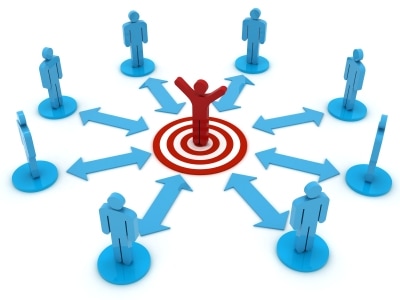|
Executive Summary: Developing a strategic and consistent process to evaluate and therefore acquire suppliers before you need them is vital to our ability in growing our company. When we utilize a systematic process we eliminate bias and emotion from the decision making process which allows us to make decisions which are capabilities and needs based rather than emotions. Your ‘minimum expectations’ list serves as a road map for decision making and comparison shopping as you engage with each supplier. Author: Travis Smith Read the full article by downloading the below PDF attachment
0 Comments
There’s a wonderful and powerful truth which exists in many facets of life having to do with relationships and leadership. It’s powerful because the impact it creates when utilized is immense, whereas it’s also a wonderful truth because it’s a quality we all possess completely free of charge. This amazing truth I speak of which impacts all of our relationships, our ability to lead and our professional experience is the all-powerful art of listening. You know, the opposite of talking, as in not speaking and allowing others to talk. I know, this is a foreign concept for many of us. Why is listening an important habit to develop to be a good leader, friend, spouse, etc? Those who possess the ability to listen earnestly experience deeper relationships, advanced awareness of how they show up and how others are impacted by them (EQ), are genuine in their care for others and are touted as being “leaders people would run through a wall for”. To become an exceptional leader, friend or spouse, you must learn to develop your listening skills. Perhaps you’re thinking, “Well, that’s not very profound. I listen all the time.” But, do you really listen, or as you simultaneously thinking about the next question or statement you’re going to say once the other person is done talking? Let’s see how good of a listener you are. If you’ve done one of the following in the last week you’ll want to continue reading this article:
The list goes on, and on, however these six items seem to be the biggest perpetrators of what we see from people who aren’t fully engaged and listening. Why don’t listen? Short answer – our egos get in the way of allowing someone else the stage to talk. The long answer – Perhaps you’re the exception as your listening skills are top notch. For everyone else out there, which I’ll gladly throw myself into this boat, we struggle with listening. We tell ourselves that others are wrong; only we know the truth; “I don’t have time for this”. We also say things like “I can multi-task while we’re talking”; or think things like ‘my point makes more sense’, ‘they’re idiots’, ‘they must not see the big picture’ (love that one), ‘they have to hear my side before we can move on’. While all of these responses are rather normal, each of them grows from the belly of the ego. We’re also an ever growing impatient bunch of people. With so much going on in the world today it’s easy to fall into the trap that we don’t have time to have a conversation, especially if that conversation isn’t of grave importance. Leaders – read closely here. The success of your job depends on your ability to listen. Forbes writer Glenn Llopis says that when “leaders judge, they expose their immaturity and inability to embrace differences.” Did you know that your act of not listening actually sent such a strong communication to the person on the other end? Imagine how it made them feel! How can we fix this? Short answer – zip it (our mouths that is) and focus on the person in front of you. Long answer – read ‘Action Item’ below. WHY should we focus on being better listeners? Key Take Away If you haven’t come to the conclusion by now, we may need to get some backup in here asap. Let me get to the point then. Your job and career as a leader depends on it. People follow and support leaders who live a servants’ mentality which means when their people have an idea, a question, a problem, or a wild haired suggestion, they listen as if listening is going out of style. Being a servant doesn’t mean a leader is weak, it means their people and company come first, before themselves. Conversation is the gateway to a persons’ mind, body and soul. Its best we listen or we’ll run the chance of missing out on some truly incredible moments. Action Item Next time you’re confronted with someone wanting your attention to converse be sure to put away your phone, your work at hand, close your computer screen or turn it off, close your door for that matter. Do whatever you need to in order to give the person on the other side of the table your complete and undivided attention. You’ll be happy you did as a results of the conversation will be far better while leaving the person on the other side of the table feeling like they were heard and cared for. The biggest fallacy in business: if I work hard I’ll eventually get to where I want to be. While hard work and a myriad of other competency-based characteristics are certainly important in growing ones career, they play second fiddle to the #1 most important thing that drives our careers. Recently I found myself engaged in a discussion I hear all too often: “I’ve been trying to land a job doing (insert job title) but I’m not getting any responses from my job applications online.” This was coupled with: “I’m trying to break into (insert industry) but I have no direct industry experience and am having a hard time with people taking my capabilities serious without industry experience.” Both of these situations and the people involved are experiencing the same thing – they haven’t built or leaned on the appropriate people to help them with their career quest. Enter in the #1 career advancement driver: RELATIONSHIPS The people which make up your professional ecosystem are ultimately the ones who will make the difference in your career, not just hard work. Back to our scenario above. Applying to jobs on the internet, or the black hole of death as I commonly refer to it, does have its merits, yet by no means are online job boards the best place to land your dream job. Online job boards are built to do one thing and one thing well – weed people like you out. According to Robert Meier, President of Job Market Experts, only 2% of candidates applying for jobs online actually get an interview. My personal experiences have shown that many people find the online job board process frustrating, cumbersome and verging on a galactic time suck. If we can’t rely on online job boards, what options do we have? Enter back to the stage our good ole friend ‘Relationships’, our #1 suitor for career advancement. Your education, hard work and perhaps charm will only take you so far. Relationships, the people above you, below you and your peers, are the ones that stand to make the biggest impact in your career. When we are in school, soon to graduate and looking for our first opportunity, it’s people that give us the chance, not necessarily our stellar academic performance. Our grades may assist in getting us to the conversation however the driver behind making the decision is someone who wants to give you a shot. Same can be said in corporate America. I remember the first time I was going for a management promotion. My boss at the time told me, “it’s not the people above you that will promote you, it’s your peers and people who report to you.” That really struck home because if my boss were to ask my peers and employees what they thought of me and the response he got was less than stellar the likelihood that feedback would impact my forward progress in my career is likely to be substantial. When you’re neck deep in your career often times it’s who you know, not what you know. The ‘who you know’ opens doors, ‘what you know’ helps you facilitate the work at hand, not landing the job itself. What many professionals miss out on is the importance of building lasting professional relationships. Not every relationship has the capacity to turn into something that is special and will impact your career however if carefully practiced and made a priority it is certainly possible several of your professional relationships overtime can produce fruitful results for both parties involved. Why is it then people don’t spend more time and energy in building their ecosystem of professional relationships? Answer: because it isn’t easy nor is it quick in producing results. Relationships take time and investment. The best relationships have a ‘pay-it-forward’ mentality where both people see the bigger opportunity to help one another without quid pro quo. If you’ve ever read the book ‘Go Giver’ by Bob Burg, it also happens to be my favorite all time book on life and business, you know that relationships and the power of doing for others often times sets the stage for incredible life experience to come. This of course is true in business. Relationships are hard to foster over long periods of time. It takes trust, consistency and energy. Yet when done genuinely relationships have the power to open doors that may not have been available without it. If you’re read this and feel like it’s time for you to step up and grow your ecosystem of professional relationships follow these steps to get on the glory road of professional relationships. 1. Understand what your WHY is for building relationships? (most importantly, what can you offer to others in the process?) 2. Identify 2-3 professionals within your circle of influence, take each of them out to coffee for the purpose of building a better, tighter and more collaborative relationship 3. Go to industry networking events 4. Rinse and repeat (a couple in-person meetings or events is only the start; build into your schedule 2-3 times a month where you make it a priority to meet with people) It’s a vital part of any professionals’ career. Networking! The people we surround ourselves with, the relationships we build and the connections we make are the secret sauce to a long term successful career. In fact, networking is one of the best things we can do to advance our careers. If networking is so important why is it so many of us go about it all wrong? For the better part of the last six years I’ve had the great opportunity to be a part of a non-profit professionals association called DeviceAlliance. It’s focus is simple - help people elevate their game professionally through impactful connections and education in Southern California. Needless to say we do a lot of networking. The time I’ve spent with this organization has opened my eyes to a lot of learning opportunities which I wouldn’t have been exposed to in a typical corporate setting. One of the biggest learning lessons has been why networking is so important. Over time I began to also learn that so many of us, including myself, went about networking all wrong. Networking professionally is a fine art, one that takes practice and consistency. In order to be an effective networker we need to keep top of mind these two important considerations: 1. Timing When we are in a time of need this is the exact wrong time to start a networking. There seems to be a common misconception that networking should only be done when we’ve ‘hit the skids’ professionally. We’ve lost our job, hate our boss or company for that matter and finally make the decision we need to get out in the world. We’re going to give it the old college try, shake some hands and kiss some babies, to hopefully wrestle up a new opportunity and get ourselves out of the mess we’re in presently. Sound familiar? Professional networking is most effective when we do it proactively, not in the moment of need. On more occasions than I can count I’ve heard people say, “I’m in transition so I’m networking to find my next gig.” Often times these people go to one event and then stop networking altogether once they land themselves a new opportunity. They’re failing to see the bigger picture which is networking is not something to do just when you need it in the moment. Long term career impact comes from a steady stream of professional networking. It becomes a constant part of your to-dos just like that morning cup of coffee you have every day. Be proactive and be consistent in your approach. 2. Quid Pro Quo I’ll do this if you give me that. When our focus is to help ourselves people can smell us from a mile away. It’s uncanny how quickly people pick up on this when they meet someone at a networking event. It’s like they’re wearing cheap perfume bought from the Dollar Store. As your unflattering fragrance permeates the air we know all too well that your intent for networking is entirely self-serving. What’s worse is that people, without realizing, can build a reputation for being self-serving which produces counterproductive results. The best approach to effective networking is to take the approach of ‘The Go-Giver’. This book has impacted my life more so than any other book I’ve read. It talks about how a genuine interest in helping others can lead to a life of fulfillment and prosperity. Essentially, if we put other people’s interests before our own what we find is that through helping others we actually benefit in the long run. Using this approach to networking helps build trust quickly which then leads to fostering new relationships and friendships. Think about it this way – the more deposits we make into the professional lives of others the wealthier we’ll be in our own careers. When it comes to professional networking timing and intent play a huge role in our success. Now that we know how to be a successful networking the next thing we need to do is get involved. Action Item: find an association, peer group or industry event you can get involved with. You’ll be glad you did. (If you are a part of the life sciences industry check here for events in Southern California) It’s amazing at how many things are sold to professionals which claim to be the next best thing in advancing your career. From books and seminars to workshops and online tutorials, there seems to be an endless supply of crap that many of us buy to help our careers yet few ever see any real return on investment. There is one thing that doesn’t rely on fancy sales pitches or overdone workbooks and it can truly elevate your professional game. Best part is we all have access to it and most often it is completely free of charge. Welcome to MENTORSHIP. No matter where you are in your career having a mentor is highly advisable as it can be the difference between you navigating the waters of a successful career versus drowning in the murky depths of the rat race. Mentors aren’t just strategic career advisors they’re the angel over your shoulder whispering sweet nothings into your ear. So if having a mentor was so impactful how come more people don’t have them? Typically it’s because we’re scared to ask for help. It’s possible we don’t think we need the help, though many would object. It could also be because we don’t know where to look to find such a connection. At the start of this year I decided it was high time to get me a new mentor. I’ve been lucky in my life to have a consistent and very good mentor in my father which I’m incredibly thankful and fortunate to have. I was looking for an additional mentor that had specific experience – growing a business from the ground up and doing so with a technical customer base. After doing some snooping around I landed on the website of Micro Mentor. It’s like a dating site for professionals looking for a mentor, but no hanky panky is involved. You fill out a profile and then your needs and interests are matched with a possible mentor. Both parties get to review one another’s profiles after which they have an initial conversation to see if the match is a good fit. This is where I met Bonnie. Fast forward Bonnie and I have now been working together for eight months and I’m continually impressed and appreciative of the guidance and thought provoking perspective she brings to the table. Bonnie started a technology service business in San Francisco a couple decades ago by investing a couple thousand dollars to start the company. From that start she grew the business to over 100 employees and has recently retired, earlier nonetheless, as a result of the success she experience along the way. Needless to say I feel like I can accomplish a lot knowing I have Bonnie in my corner. (let’s also not forget my father) Why am I sharing this with you? If you don’t have a mentor you need to get one! The relationship, when done right, will positively change every aspect of your career and outlook on business. I’m so passionate about mentoring that I too am a mentor – it’s worth every minute of my day. Here’s what mentors, like Bonnie and my father, bring to the table and why they’re so incredibly valuable to you and I: > Business Savvy – they bring experience and knowledge to the table that just can’t be matched by a text book or online workshop. You can’t replace real experience. Learning from a mentor isn’t just about accomplishing big feats it’s also about learning from their mistakes. Yes they’ve made plenty of them just like you and I. > External Perspective – often times when we need advice we go to people who are close to us, most commonly that work for the same company. While that isn’t necessarily a bad thing what is important to remember is that these people have a certain level of bias in their thoughts and advice. Having a mentor outside your company gives you the chance to get advice which focuses on the situation at hand rather than personal bias or internal company politics. Mentors can also share with you how they have dealt with situations perhaps in other lines of business or industries which could provide you with a fresh approach to handling a situation. When your mentor is outside your company you can also rest easier knowing you can share your true feelings and thoughts and know that information won’t get back to your boss or be passed along at the water cooler. > Confidant – Mentor are great listeners. Like my mentor Bonnie, she’ll sit on the phone with me and graciously give me ample time to spill my guts at which point she does an excellent job summarizing the situation and delivering exceptional feedback. I trust that I can be open with her which ultimately helps my development process. > Accountability – Mentors vary greatly in this area and how they approach it. If you are going to ask for a mentor make sure you are willing to actually implement the ideas and suggestions the two of you collectively come up with. There’s no better way to ruin a good mentor relationship than to talk the talk but not walk the walk. If you are one of those people that sometimes needs a swift kick in the ass to get going mentors can also be utilized for that, just be careful how much ass kicking you need. Mentors ultimately aren’t baby sitters and they’re not supposed to run your business or career for you. > Comfort Zone Executioners – let’s face it, we all love dancing in the comfort zone for longer than we should. Mentors are great at breaking up common thoughts or practices to get you out of your area of complacency. When this happens true growth is right around the corner. Recently I found myself in a really interesting conversation with a longtime friend about relationships, dating to be more specific. My friend was sharing with me that he had just started dating a new girl at the beginning of January and was excited about the chemistry they had at such an early stage in the relationship.
As the conversation continued I learned that my friend and his new girlfriend, yes titles are already in full swing four weeks into it, are moving rather quickly in their relationship and the conversations about future events and experiences are permeating their every moment. My friend, let’s call him Nacho, further shares that “things are escalating quickly”. Nacho confides in me that he’s in a bit of a tight situation as he’s only been dating his new girlfriend for about a month and Valentine’s Day is coming up in less than a week and doesn’t know what he should do. I had to laugh because I knew exactly where he was heading. What should good ole Nacho, or any man for that matter, do in this situation as his decision on the upcoming event could make or break the future of this new budding relationship. As we discussed further we concluded there were three main options to choose from:
As we further discussed each option I shared with him a phrase I’m all too familiar with in the professional setting and in this particular case found it rather helpful. “Nacho, what do you know about Managing Expectations?” I said. He immediately shared with me that ‘Managing Expectations is when you’re realistic upfront in order to prevent disappointment on the back end. Simply put – don’t over promise and under deliver.’ Bingo! Nacho hit it spot on. To find out which option Nacho picked and what the result was, click here. About the AuthorTravis Smith is the founder and managing director of Square-1 Engineering, a medical device consulting firm, providing end to end engineering and compliance services. He successfully served the life sciences marketplace in SoCal for over 15 years and has been recognized as a ‘40 Under 40’ honoree by the Greater Irvine Chamber of Commerce as a top leader in Orange County, CA. Categories
All
Archives
July 2024
|
||||||
Visit Square-1's
|
|







 RSS Feed
RSS Feed


